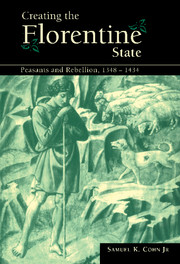Book contents
- Frontmatter
- Contents
- List of illustrations
- List of tables
- Acknowledgements
- Note on citations, dates, and measures
- Introduction
- PART I CULTURE, DEMOGRAPHY, AND FISCALITY
- PART II PEASANT PROTEST IN THE MOUNTAINS: THREE VIEWS
- PART III GOVERNMENTAL CLEMENCY AND THE HINTERLAND
- Conclusion
- Appendix 1 Regression models: wealth, migration, and taxes
- Appendix 2 Tax coefficients, 1354–1423
- Bibliography
- Index
Conclusion
Published online by Cambridge University Press: 07 August 2009
- Frontmatter
- Contents
- List of illustrations
- List of tables
- Acknowledgements
- Note on citations, dates, and measures
- Introduction
- PART I CULTURE, DEMOGRAPHY, AND FISCALITY
- PART II PEASANT PROTEST IN THE MOUNTAINS: THREE VIEWS
- PART III GOVERNMENTAL CLEMENCY AND THE HINTERLAND
- Conclusion
- Appendix 1 Regression models: wealth, migration, and taxes
- Appendix 2 Tax coefficients, 1354–1423
- Bibliography
- Index
Summary
The Florentine oligarchy was slow in reckoning the demographic consequences of the Black Death and peasant flight for the political fate of its territorial state. The mid and late Trecento plagues passed without legislative intervention or welfare measures to soften the blows of illness, death, and increased taxation. The first inklings of change came with Florence's transformation of its policies toward agricultural labor. In 1364, Florence replaced the whip of labor restrictions with the carrot of tax incentives to entice Florence's own agricultural laborers to return from foreign lands and to attract new foreign laborers to work its lands.
Although the Florentine councils repeated such measures with increasing incentives through the Trecento, it was as though Florence's policy toward its rural subjects was governed by one hand taking from what the other gave. The city hammered its rural subjects with ever-increasing levies which exacted ever-increasing proportions of the peasants' surplus, even as the countryside was increasingly torched by warfare and disembodied by disease. Further, these fiscal policies created economic differences between the lowlands near the city and the distant mountains of the Florentine periphery. New Florentine wars against Milan and the elitist politics of the Albizzi regime in the closing years of the fourteenth century accelerated still further Florentine demands on the countryside and fiscal inequalities between lowlanders and highlanders.
- Type
- Chapter
- Information
- Creating the Florentine StatePeasants and Rebellion, 1348–1434, pp. 268 - 272Publisher: Cambridge University PressPrint publication year: 1999



